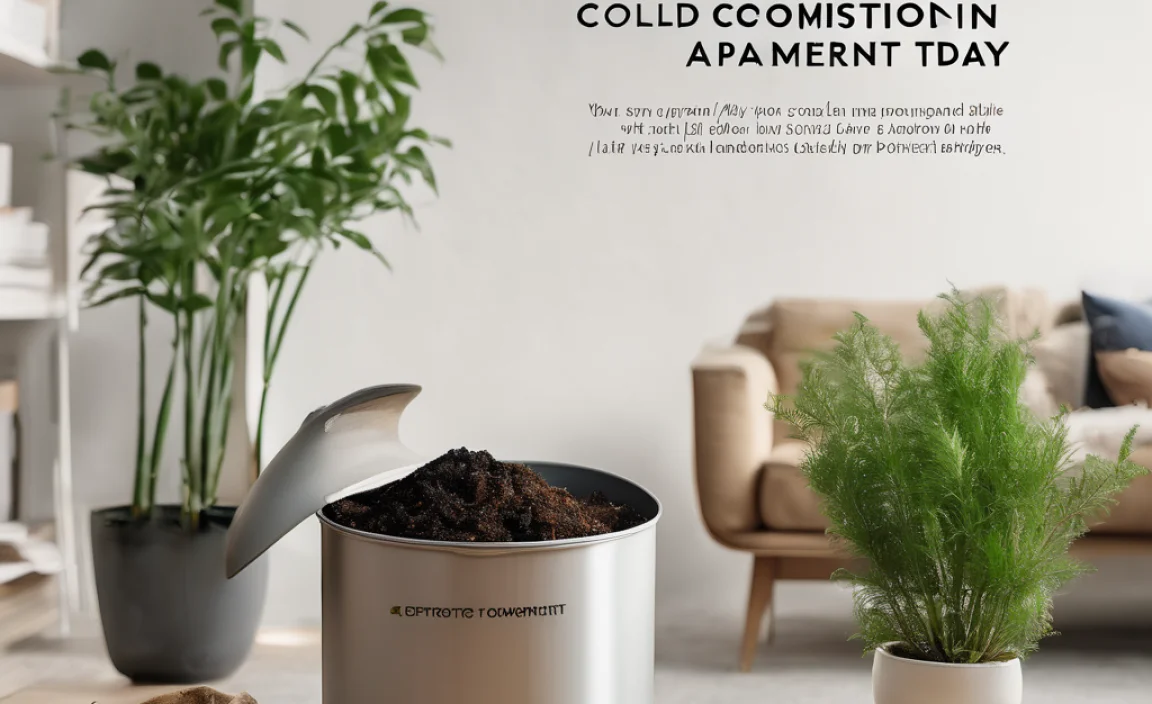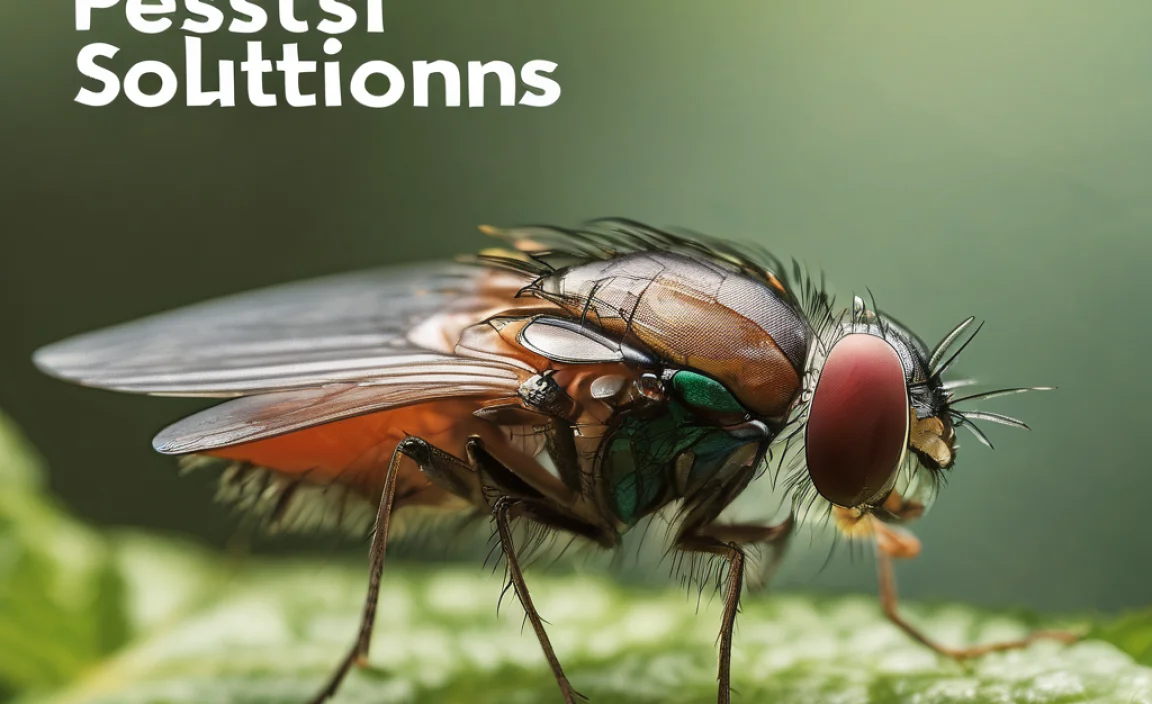Have you ever wondered what happens in a compost pile? Imagine a bustling city of tiny creatures working hard to break down food scraps and leaves. These creatures are known as hot composting bugs. They play an important role in turning waste into rich, dark soil. This process is called hot composting. Let’s explore the exciting world of these incredible bugs!
Key Takeaways
- Hot composting bugs break down organic waste into soil.
- They thrive in temperatures between 113°F and 160°F.
- These bugs need air, water, and food to survive.
- Hot composting is faster than cold composting methods.
- Temperature affects the activity of hot composting bugs.
The Role Of Hot Composting Bugs
Hot composting bugs are the tiny heroes in your compost pile. They are responsible for breaking down organic materials quickly. These bugs include bacteria, fungi, and other microorganisms. They love warmth and thrive in temperatures between 113°F and 160°F. When they are active, they generate heat, speeding up the composting process. Hot composting is faster than other methods because of these bugs. It can turn waste into rich soil in just a few weeks.
- Hot composting bugs speed up the decomposition process.
- They generate heat when breaking down materials.
- Proper temperature is crucial for their activity.
- They work best in a balanced compost pile.
- They need oxygen to survive and thrive.
When you maintain the right conditions, these bugs will do their job efficiently. This means keeping your compost pile warm, moist, and well-aerated. By doing so, you can enjoy nutrient-rich soil for your garden. It’s amazing how such small creatures can make a big impact on our environment.
Fun Fact: Some bacteria in compost can double their population in just 20 minutes!
Why Temperature Matters
Have you ever wondered why a compost pile feels warm? That warmth comes from the hard work of hot composting bugs. They thrive in warm conditions, but why is temperature so important? Just like humans, these bugs have their favorite temperature range. If it’s too cold, they slow down or stop working. If it’s too hot, they can die. Keeping your compost pile in the right temperature range ensures it breaks down quickly and efficiently.
How Bugs Break Down Waste
Have you ever seen a pile of leaves turn into rich soil? That transformation is the work of hot composting bugs. They eat the waste and break it down into smaller pieces. During this process, they release nutrients that plants love. These bugs are like tiny chefs preparing a soil feast for your garden. Without them, our compost piles would take much longer to turn into soil.
Creating The Perfect Home For Bugs
Do you know how to make hot composting bugs happy? It’s simple! Think of it as building a cozy home for them. They need three things: air, water, and food. Aerating the pile gives them oxygen. Water keeps them moist, like rain in a forest. And food, such as fruits and vegetable scraps, gives them energy. Give them what they need, and they will work hard for you!
Essential Conditions For Hot Composting Bugs
Hot composting bugs have specific needs. To keep them active, create the right conditions. They require a balanced mix of green and brown materials. Green materials include grass clippings and vegetable peels. Browns are items like dry leaves and straw. Keep the pile moist, like a damp sponge. Turn the pile regularly to give them air. With these conditions, your compost will break down quickly.
- Green and brown materials provide nutrients.
- Moisture is vital for bug activity.
- Turning the pile adds necessary oxygen.
- Bugs require a balanced carbon-to-nitrogen ratio.
- Bugs work faster in well-maintained piles.
Having the right conditions means that your compost will not only break down quickly, but also create a healthy environment for the bugs. This ensures that the nutrient content of your finished compost is rich and beneficial for your plants.
Fun Fact: Hot composting bugs can digest waste 10 times faster than cold composting!
Green And Brown Balance
Do you know why your compost pile needs both greens and browns? It’s all about balance. Greens like grass clippings provide nitrogen. Browns like dried leaves give carbon. Bugs need both to thrive. Too much green can make the pile smelly. Too many browns slow down decomposition. The perfect mix keeps bugs happy and composting fast.
The Importance Of Moisture
Have you ever noticed how much water is in a forest? It’s the same for your compost pile. Hot composting bugs need moisture to survive. Without water, they can’t work their magic. The pile should feel like a damp sponge. Not too wet or too dry. When it has the right moisture, bugs can digest waste quickly, turning it into nutrient-rich soil.
Turning The Pile For Air
Why do we need to turn compost piles? It’s simple: bugs need air! Just like us, they breathe oxygen. Turning the pile gives them fresh air. Without it, they slow down or stop working. Regularly turning the pile also helps mix green and brown materials. This ensures the bugs have everything they need. A well-aerated pile is a happy home for hot composting bugs.
Tools And Techniques For Effective Composting
Composting tools can make the process easier and more efficient. Popular tools include pitchforks, compost thermometers, and tumblers. A pitchfork helps in turning the pile, while a thermometer checks the temperature. Tumblers are great for beginners as they mix and aerate the compost easily. Understanding these tools helps you maintain a healthy environment for hot composting bugs. Knowing the right techniques will speed up the composting process and give you rich soil quickly.
- Pitchforks are essential for turning compost piles.
- Thermometers help monitor the pile’s temperature.
- Compost tumblers mix and aerate the pile easily.
- Tools help maintain proper conditions for bugs.
- Using tools correctly gives faster compost results.
Having the right tools can make a big difference in your composting journey. They help you work efficiently and keep your compost pile healthy. By using these tools, you can ensure your hot composting bugs stay active and happy, resulting in rich, fertile compost for your garden.
Fun Fact: A compost pile can reach temperatures of up to 160°F!
Using A Pitchfork
Have you ever tried turning a compost pile? It can be hard without the right tool. A pitchfork makes it easy. It helps mix the pile, introducing air for bugs. Turning the pile regularly ensures even decomposition. A pitchfork is a composting hero. With it, you can keep your hot composting bugs happy and productive. It’s a must-have tool for every compost lover.
Checking Compost Temperature
Do you know how hot your compost pile should be? A compost thermometer can tell you. It helps you maintain the right temperature for hot composting bugs. Too cold, and they slow down. Too hot, and they might die. Checking the temperature keeps your composting on track. With the right temperature, your bugs stay active, working hard to break down waste.
The Convenience Of Compost Tumblers
Have you ever used a compost tumbler? It’s a great tool for composting. Tumblers mix the pile with a simple turn. They keep the pile aerated, providing air for hot composting bugs. They are easy to use and maintain. Just add materials, turn, and let the bugs do their work. Tumblers make composting simple and efficient. They are perfect for beginners and seasoned composters alike.
The Importance Of Hot Composting In Gardening
Hot composting is vital for gardeners. It creates rich, nutrient-filled soil. This soil improves plant growth and health. Hot composting is faster than cold methods. It breaks down waste in weeks instead of months. This means more frequent soil production for your garden. Hot composting also kills weed seeds and harmful pathogens. This keeps your garden healthy and thriving. Every gardener should consider hot composting for better garden results.
- Hot composting produces nutrient-rich soil quickly.
- It speeds up the decomposition process.
- Kills weed seeds and harmful bacteria.
- Improves overall plant health and growth.
- Reduces the need for chemical fertilizers.
By using hot composting, gardeners can enjoy the benefits of home-produced compost. This reduces reliance on store-bought fertilizers and helps save money. It also ensures that the soil remains healthy and full of nutrients, which in turn leads to a thriving and successful garden.
Fun Fact: One cubic yard of compost can hold up to 150 gallons of water!
Faster Composting Benefits
Do you prefer quick results? Hot composting delivers exactly that. Unlike cold composting, which can take months, hot composting works fast. You can have ready-to-use soil in just a few weeks. This speed is due to the hard work of hot composting bugs. They break down materials quickly, providing gardeners with a steady supply of compost. Quick results mean healthier plants faster.
Improving Soil Health
Have you seen a garden with rich soil? It’s likely thanks to compost. Hot composting adds nutrients to the soil, benefiting plant growth. Healthy soil is full of life and supports thriving plants. By adding compost from hot composting, gardens become more fertile. This natural process reduces the need for chemical fertilizers, promoting sustainable gardening practices.
Reducing Waste While Gardening
Do you want to reduce waste? Hot composting helps with that too. By composting kitchen scraps and yard waste, you reduce landfill contributions. It’s an eco-friendly way to recycle organic materials. Not only does this make your garden greener, but it also benefits the environment. Every gardener can make a positive impact by choosing hot composting.
Temperature, Air, Water: The Composting Trio
Temperature, air, and water are essential for hot composting bugs. These three factors create the best environment for them. Keeping the compost pile warm ensures active bug work. Air is crucial for their survival and effective decomposition. Water keeps them moist and active. Balancing these elements is key to successful composting. The right mix speeds up the process and improves compost quality.
- Temperature affects bug activity and compost speed.
- Air is vital for bugs’ survival and effective work.
- Water maintains a damp environment for bugs.
- Balancing these elements fosters a thriving compost pile.
- Proper mix leads to high-quality compost results.
Understanding and managing temperature, air, and water is crucial for any composter. By doing so, you provide an ideal habitat for hot composting bugs. This results in a quicker and more efficient composting process, providing you with excellent compost for your gardening needs.
Fun Fact: A healthy compost pile can generate enough heat to steam on a cold day!
Managing Compost Temperature
How do you keep your compost pile warm? It’s essential for hot composting bugs. Insulating the pile with straw helps retain heat. A proper balance of green and brown materials generates warmth. Regularly turning the pile distributes heat evenly. Monitoring the temperature ensures it stays in the right range. A warm pile means happy, active bugs.
Ensuring Proper Airflow
Why is airflow important in composting? Bugs need it to breathe! Turning the compost pile introduces fresh air. Proper airflow prevents bad smells and speeds up decomposition. It ensures that hot composting bugs can work efficiently. A well-aerated pile is a thriving environment for bugs. Ensuring good airflow keeps your composting process on track.
Maintaining Moisture Levels
Have you ever wondered how much water your compost needs? It should feel like a damp sponge. Too little water, and bugs slow down. Too much, and they drown. Proper moisture levels ensure active decomposition. Regularly check moisture to maintain an ideal environment for hot composting bugs. The right moisture means faster, more efficient composting.
Conclusion
Hot composting bugs are small but mighty. They transform waste into rich soil quickly. By understanding their needs and creating the right environment, you can compost effectively. These bugs thrive with the right temperature, air, and water. Remember, taking care of them means they take care of your compost. They are essential for successful hot composting. Treat them well, and they will reward you with nutritious soil.
FAQs
Question: What are hot composting bugs?
Answer: Hot composting bugs are tiny creatures that help decompose organic waste. They include bacteria, fungi, and other microorganisms. These bugs thrive in warm temperatures and speed up the composting process. They turn waste into nutrient-rich soil quickly, making them essential for gardeners.
Question: How do I keep my compost pile warm?
Answer: To keep your compost pile warm, insulate it with materials like straw. Use a balanced mix of green and brown materials to generate heat. Turn the pile regularly to distribute warmth. Monitor the temperature with a compost thermometer. A warm pile ensures active hot composting bugs.
Question: Why is airflow important for composting?
Answer: Airflow is important because hot composting bugs need oxygen to survive. Turning the pile introduces fresh air, preventing bad smells and speeding up decomposition. Proper airflow ensures bugs work efficiently, leading to faster composting and better-quality soil.
Question: What tools are useful for composting?
Answer: Useful composting tools include pitchforks, thermometers, and compost tumblers. A pitchfork helps turn the pile, adding air. Thermometers check the temperature to keep it in the right range. Tumblers make mixing and aerating easy. These tools help maintain the best conditions for hot composting bugs.
Question: How can I tell if my compost pile has enough moisture?
Answer: Check if your compost pile feels like a damp sponge. It should be moist but not soggy. Too little moisture slows down bugs, while too much water can drown them. Regularly check and adjust the moisture level to keep hot composting bugs active and efficient.
Question: What are the benefits of hot composting for gardening?
Answer: Hot composting produces nutrient-rich soil quickly, improving plant growth. It kills weed seeds and harmful bacteria, promoting a healthy garden. Hot composting reduces the need for chemical fertilizers. It’s an eco-friendly way to recycle organic waste, benefiting both your garden and the environment.



